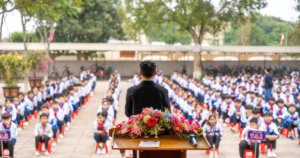The Extended Weekend: A Catalyst for Holistic Growth in the NEP 2020 Era – A Deeper Dive By Sanjay Srivastava, Math’s Teacher, Crescent Public School, Ballarpur
The mind is not a vessel to be filled, but a fire to be kindled – Plutarch.
This timeless wisdom resonates deeply with my philosophy as a mathematics teacher at Crescent Public School, Ballarpur. My journey has consistently reinforced the belief that true learning transcends the boundaries of traditional classrooms and textbooks. It’s about cultivating critical thinkers, fostering well-rounded personalities, and empowering both students and educators to reach their full potential. In this pursuit, the progressive policy of designating the 2nd and 4th Saturdays as holidays emerges as a truly transformative initiative, aligning seamlessly with the forward-thinking vision of the National Education Policy (NEP) 2020.
The NEP 2020 is not just a policy document; it’s a blueprint for a revitalized education system, emphasizing holistic development, experiential learning, and a multidisciplinary approach. Crucially, it re-establishes teachers as the linchpin of this transformation, advocating for their continuous professional growth and overall well-being. The extended weekends, afforded by these Saturday holidays, serve as a potent tool to actualize these aspirations, creating a ripple effect of positive change throughout our educational ecosystem here in Ballarpur, Maharashtra.
Empowering Students
Nurturing Beyond the Syllabus For our students, these additional days are far more than just a break; they are an invaluable opportunity for rejuvenation, exploration, and the pursuit of passions that contribute to their overall development.
Cultivating Hobbies and Interests
In the relentless academic rhythm of our schools, students often find little bandwidth to delve into interests beyond their syllabi. These holidays offer a precious gift of time. Imagine a student from our very own Crescent Public School, deeply fascinated by robotics, who can now dedicate an entire Saturday to attending online workshops, participating in robotics competitions, or even building a small, functional robot. This hands-on engagement fosters not only technical skills but also problem-solving abilities and a growth mindset, directly aligning with NEP 2020’s emphasis on identifying and nurturing the unique talents and creative potential of every child. Similarly, a budding classical dancer can dedicate hours to practice, or a young writer can immerse themselves in crafting stories, unburdened by daily assignments. This unstructured yet purposeful time is crucial for developing intrinsic motivation and a lifelong love for learning.
Strengthening Family Bonds and Social-Emotional Intelligence
The demands of modern life often limit quality family time. The extended weekend provides a vital window for families to connect, engage in shared activities, and strengthen their relationships. Consider a family in Ballarpur using a 2nd Saturday to embark on a nature walk in the nearby Tadoba Andhari Tiger Reserve, observing wildlife and learning about biodiversity firsthand. This experience, far richer than any textbook lesson, fosters a child’s appreciation for nature, promotes environmental awareness, and creates lasting memories. Beyond family, these holidays also allow for participation in community service, fostering empathy and social responsibility. As a mathematics teacher, I’ve seen how strong social-emotional foundations are crucial for academic success and overall well-being, aspects that NEP 2020 implicitly encourages through its focus on developing a well-rounded personality with strong ethical grounding.
Prioritizing Rest and Mental Well-being
The pervasive pressure on students today to excel academically can lead to significant stress and burnout. A three-day weekend is a powerful antidote, offering ample time for rest, relaxation, and mental recalibration. Anecdotally, I’ve observed that students who return to school on Monday after a truly restful weekend are demonstrably more attentive, engaged, and receptive to new concepts. Their concentration levels are higher, and their problem-solving abilities are sharper. This directly supports the NEP’s goal of creating a positive and nurturing learning environment where students feel safe, supported, and motivated to learn. A fatigued mind struggles to grasp complex mathematical concepts, whereas a refreshed mind embraces challenges with enthusiasm. Nurturing Our Educators: The Cornerstone of NEP 2020 The NEP 2020 unequivocally positions teachers at the very heart of educational reform. It champions their empowerment, continuous professional development, and overall well-being. The 2nd and 4th Saturday holidays are not merely a perk but a critical enabler in achieving these objectives.
Dedicated Time for Professional Development and Skill Enhancement
Effective teaching in the 21st century demands continuous learning and adaptation. These holidays provide invaluable dedicated time for teachers to engage in Continuous Professional Development (CPD). Instead of trying to squeeze in online courses or workshops after an exhausting school day, teachers can now immerse themselves fully in learning new skills or deepening their existing knowledge. For instance, our science teachers could participate in an immersive workshop on integrating Artificial Intelligence (AI) tools into their classroom instruction, or our language teachers could delve into advanced pedagogies for fostering critical literacy and creative expression. This directly aligns with NEP’s mandate for teachers to undergo at least 50 hours of CPD annually, ensuring they remain at the forefront of educational innovation and possess the necessary skills to implement competency-based learning and experiential pedagogies. Many national and international online platforms offer a plethora of specialized courses, and teachers can now truly leverage these resources.
Fostering Curriculum Innovation and Collaborative Planning
Creating truly engaging and effective learning experiences requires thoughtful planning, curriculum adaptation, and often, interdisciplinary collaboration. The additional Saturdays empower teachers to collaboratively plan intricate projects that transcend subject boundaries, design innovative assessment strategies that move beyond rote memorization, and prepare hands-on activities that align with NEP’s emphasis on experiential learning. Imagine our history and art teachers at Crescent collaborating on a project where students research the rich history of Gond tribal art from our region of Maharashtra, then recreate similar art forms, incorporating mathematical principles of symmetry and geometry. This kind of project-based learning, which is a cornerstone of NEP 2020, requires significant planning time that is often scarce during regular school weeks. These holidays provide that crucial space for such pedagogical innovation.
Promoting Personal Recharge and Well-being
Like their students, teachers too are susceptible to burnout.The relentless demands of the profession, coupled with personal responsibilities, can take a toll. A refreshed teacher is a more enthusiastic, patient, and effective educator. These extended breaks contribute significantly to improving their work-life balance, leading to increased job satisfaction, reduced stress levels, and ultimately, a more positive and productive classroom environment. This directly impacts their interactions with students, fostering a more nurturing and inspiring learning atmosphere. Furthermore, schools can utilize these Saturdays for optional wellness activities, mindfulness sessions, or even informal gatherings that foster a strong sense of community and camaraderie among the staff, creating a supportive professional network.
Real-World Alignment and a Future-Ready Approach
The concept of extended weekends for schools, while a significant step in India, finds parallels in various global models that prioritize well-being and holistic development. In several European countries, schools often operate on shorter weeks or have longer breaks, recognizing the importance of unstructured time for children’s development. While a full four-day school week might be a larger systemic shift requiring meticulous planning of instructional hours, the 2nd and 4th Saturday holidays are a practical, impactful, and easily implementable step in the right direction for our context.
The NEP 2020’s paradigm shift from what to think to how to think necessitates an environment where critical thinking, creativity, and problem-solving are not just taught but deeply experienced. The extended weekends provide the much-needed space and time for both students and teachers to engage in these deeper forms of learning and personal development, away from the rigid strictures of a traditional academic week.
At Crescent Public School, Ballarpur, we see these holidays not merely as days off from school, but as strategic investments in the future – in the intellectual, emotional, and creative growth of our children, and in the continuous professional enrichment of our dedicated educators. By embracing this forward-thinking policy, we are not just aligning ourselves with the letter of the NEP 2020; we are embodying its spirit, actively cultivating an educational ecosystem where learning is joyful, holistic, and truly transformative, preparing our students to thrive in an ever-evolving world.
Education is not preparation for life; education is life itself.– John Dewey.





